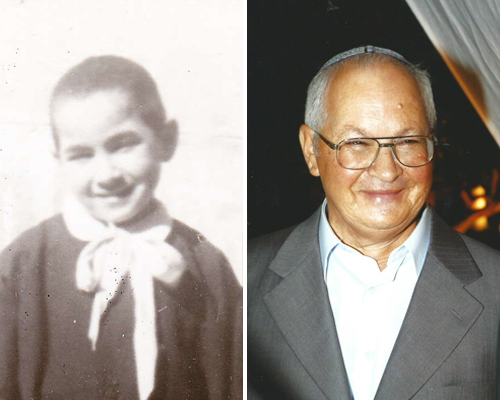Vittorio Vivanti Identified
September 2, 2015

Vittorio Vivanti’s widow, Carla Vivanti, tells us that this photo was taken in an orphanage in Rome, where Vittorio lived from age six to age 13. The picture probably was sent to a Jewish foster family in the United States that sent gifts to Vittorio. He remembered having a plaid shirt that he was very proud of—a gift received at a time when was little to be happy about.
Vittorio was born in Rome on June 12, 1938. He was two years younger than his brother, Cesare. His father, David, was an employee of the Italian postal service. His mother, Flora Supino, was a preschool teacher. As government employees, both parents lost their jobs in 1938, when Italy applied racial laws modeled on the Nuremberg code.
In order to support his young family, David became a construction worker. Hiring a Jew, however, implied some risk for the employer; in this case, Mr. Conti, the owner of a construction firm, owed David a big favor. Years earlier, David had rescued Mr. Conti when he was about to drown. Grateful to this brave and generous man, Mr. Conti offered him a job when he needed it most. Later, when the Germans occupied Rome, he also offered him a place to hide.
On October 16, 1943, Germans entered the ghetto and rounded up more than 1,000 people. Most of them later were deported to Auschwitz. Vittorio’s family did not live in the ghetto, but they heard about the round up. They left their apartment in Viale Eritrea and took shelter in a barrack on the construction site where Vittorio worked.
When the Germans arrived at the Vivantis’ address, they found another family living in the home. A few months earlier, after Rome had been bombed, David met a family that had lost its house and invited them to share his family’s apartment. Once again, David’s generosity saved his family; the Germans thought the Jewish family had left Rome and stopped searching for them.
During the German occupation, Vittorio spent time hiding in the convent of Saint Costanza, in Via Nomentana, while his father worked at the construction site.
The Allies entered Rome in June 1944. It was supposed to be the end of a nightmare, but for the Vivanti family, more sorrows were to come. The day after Rome was liberated, Flora’s sister was walking toward a synagogue with her husband and son, Giorgio Procaccia. They had just left the place were they had been hiding for months. A truck driven by drunken boys hit and killed her right in front of her son.
In July, David fell from a scaffold while working and died. Flora, who had survived the worst of the occupation, fell into a severe depression and spent many years in a hospital. More than ten people related to Flora had lost their lives because of the occupation, including her brother, Settimio, and her mother, Laura Romanelli, who probably died of hunger in her own home.
Unable to care for her sons, Flora placed them in a Jewish orphanage. Cesare and Vittorio spent seven years in the orphanage until their aunts and uncles could provide the support their mother still was unable to give them.
Vittorio was a good student. At age 18, he started to work as an accountant in a print shop while attending the University La Sapienza in Rome, where he earned a degree in economics and business administration. Between 1964 and 1966, he performed his mandatory military service.
As soon as he left the military, Vittorio married Carla Valpiana, a girl he had met in a seaside town two years earlier. Together, in 1969, they moved to Israel. No one from either of their families had left Italy, and their relatives thought it was an insane idea. Nevertheless, Vittorio and Carla found their home in Jerusalem.
Vittorio started working at the National Institute of Statistics, and soon after at the Hadassah Medical Center, where he became the vice director of administration. After retiring in 2005, Vittorio continued to volunteer at the hospital.
On March 21, 2013, Vittorio died of a sudden heart attack, leaving behind his wife and their three children, Susan, David Emanuele, and Refael.